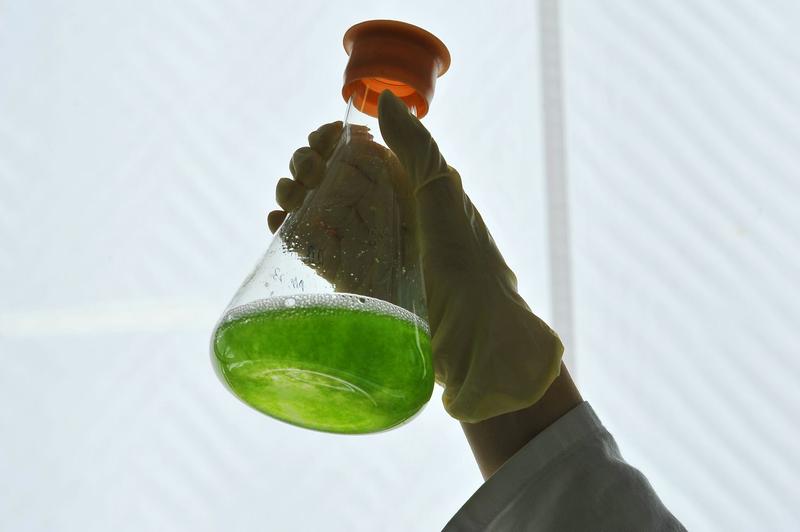

Moss cells in an Erlenmeyer-flask. Photo: Sigrid Gombert (Freiburg)
For millions of years, plants have been producing highly complex molecules out of simple chemical building blocks, sustainably and cheaply. Many of these chemical substances are used in medicine and the perfume industry today. Prof. Dr. Ralf Reski from the Faculty of Biology of the University of Freiburg, Germany, will be further developing a variety of mosses as sustainable and fast-growing molecule factories in the MossTech project.
The project’s coordinator is the Technical University of Denmark in Copenhagen, and participants include the University of Lund in Sweden, the Gulbenkian Institute in Portugal, and the companies Taxa Biotechnologies from the US, Transactiva from Italy, ArcticMass from Island, and Mosspiration Biotech from Denmark. As an EU-designated Innovative Training Network (ITN), the project will receive €1.6 million from the EU over the next four years as part of its Horizon 2020 program. Roughly €500,000 will go to the University of Freiburg.
Next to seed plants, mosses are the second largest group of land plants today. Prof. Dr. Reski, who is a plant biotechnologist, and his research lab were able to demonstrate that the genome of the moss Physcomitrella patens has roughly 10,000 more genes than the human genome, and that many of these genes are responsible for the synthesis of highly complex chemical molecules, including long-chain polyunsaturated fatty acids.
The group of scientists at the University of Freiburg have also developed genetic engineering methods that enabled them to change the moss genome in a targeted and precise manner. Similar genome editing methods using CRISPR/Cas9 technology on other plants and animals have also earned much attention in the past.
Of the six PhD students who will be involved in the MossTech project, two will spend a year at the University of Freiburg learning these methods before continuing to develop them for another two years with one of the project’s industrial partners in Denmark or Italy. The goal is to apply these methods to mosses that have not yet been researched in the hopes of cheaply and safely producing complex fine chemicals in genetically modified mosses.
“I’m excited that we were able to convince four (for us) new small and medium-sized businesses to support moss engineering. This gives us a new opportunity to translate our research into actual products,” Reski said. “After completing this very international and practice-oriented training, our young researchers will have excellent prospects on the European labor market.”
The biologists at the University of Freiburg are specialized in moss research and have made a significant contribution to the development of mosses as a global model organism in biology and biotechnology. Ralf Reski is a biologist and the Chair of Plant Biotechnology at the University of Freiburg. He is also a member of the cluster of excellence BIOSS Center for Biological Signalling Studies and was a senior fellow at the Freiburg Institute for Advanced Studies (FRIAS) and its French counterpart the University of Strasbourg Institute for Advanced Study (USIAS).
Chair Plant Biotechnology at the University of Freiburg
http://www.plant-biotech.net
MossTech Project
http://www.mosstech.eu
Contact:
Prof. Dr. Ralf Reski
Faculty of Biology
Chair Plant Biotechnology
University of Freiburg, Germany
Phone: +49 (0)761/203-6968
E-Mail: pbt@biologie.uni-freiburg.de
https://www.pr.uni-freiburg.de/pm-en/2017/building-new-moss-factories












